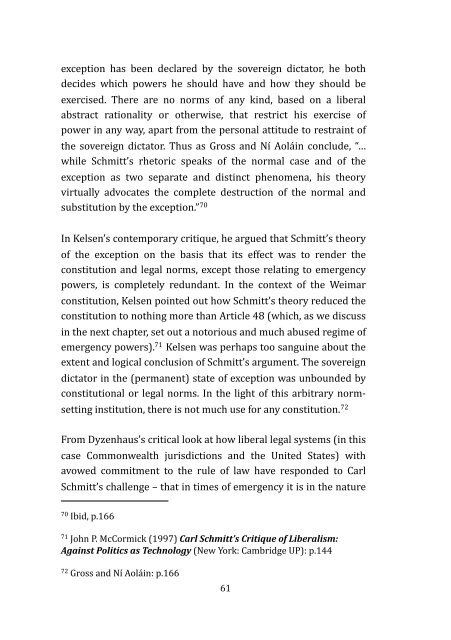States of Emergency - Centre for Policy Alternatives
States of Emergency - Centre for Policy Alternatives
States of Emergency - Centre for Policy Alternatives
Create successful ePaper yourself
Turn your PDF publications into a flip-book with our unique Google optimized e-Paper software.
exception has been declared by the sovereign dictator, he both<br />
decides which powers he should have and how they should be<br />
exercised. There are no norms <strong>of</strong> any kind, based on a liberal<br />
abstract rationality or otherwise, that restrict his exercise <strong>of</strong><br />
power in any way, apart from the personal attitude to restraint <strong>of</strong><br />
the sovereign dictator. Thus as Gross and Ní Aoláin conclude, “…<br />
while Schmitt’s rhetoric speaks <strong>of</strong> the normal case and <strong>of</strong> the<br />
exception as two separate and distinct phenomena, his theory<br />
virtually advocates the complete destruction <strong>of</strong> the normal and<br />
substitution by the exception.” 70<br />
In Kelsen’s contemporary critique, he argued that Schmitt’s theory<br />
<strong>of</strong> the exception on the basis that its effect was to render the<br />
constitution and legal norms, except those relating to emergency<br />
powers, is completely redundant. In the context <strong>of</strong> the Weimar<br />
constitution, Kelsen pointed out how Schmitt’s theory reduced the<br />
constitution to nothing more than Article 48 (which, as we discuss<br />
in the next chapter, set out a notorious and much abused regime <strong>of</strong><br />
emergency powers). 71 Kelsen was perhaps too sanguine about the<br />
extent and logical conclusion <strong>of</strong> Schmitt’s argument. The sovereign<br />
dictator in the (permanent) state <strong>of</strong> exception was unbounded by<br />
constitutional or legal norms. In the light <strong>of</strong> this arbitrary normsetting<br />
institution, there is not much use <strong>for</strong> any constitution. 72<br />
From Dyzenhaus’s critical look at how liberal legal systems (in this<br />
case Commonwealth jurisdictions and the United <strong>States</strong>) with<br />
avowed commitment to the rule <strong>of</strong> law have responded to Carl<br />
Schmitt’s challenge – that in times <strong>of</strong> emergency it is in the nature<br />
70<br />
Ibid, p.166<br />
71<br />
John P. McCormick (1997) Carl Schmitt’s Critique <strong>of</strong> Liberalism: <br />
Against Politics as Technology (New York: Cambridge UP): p.144<br />
72<br />
Gross and Ní Aoláin: p.166<br />
61











